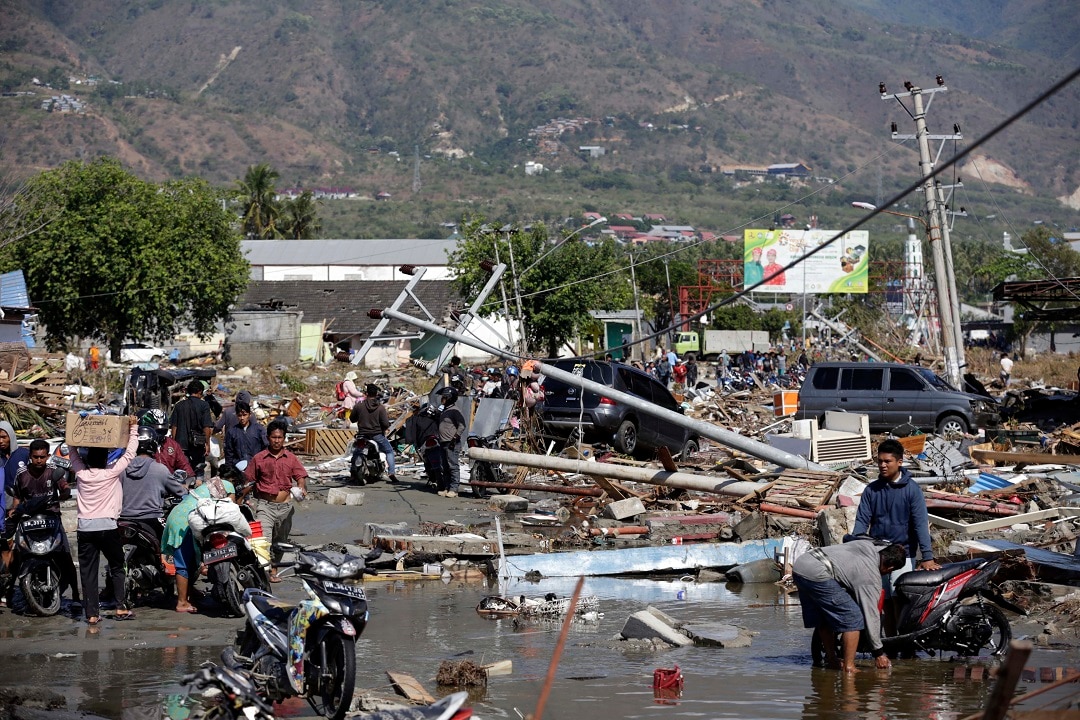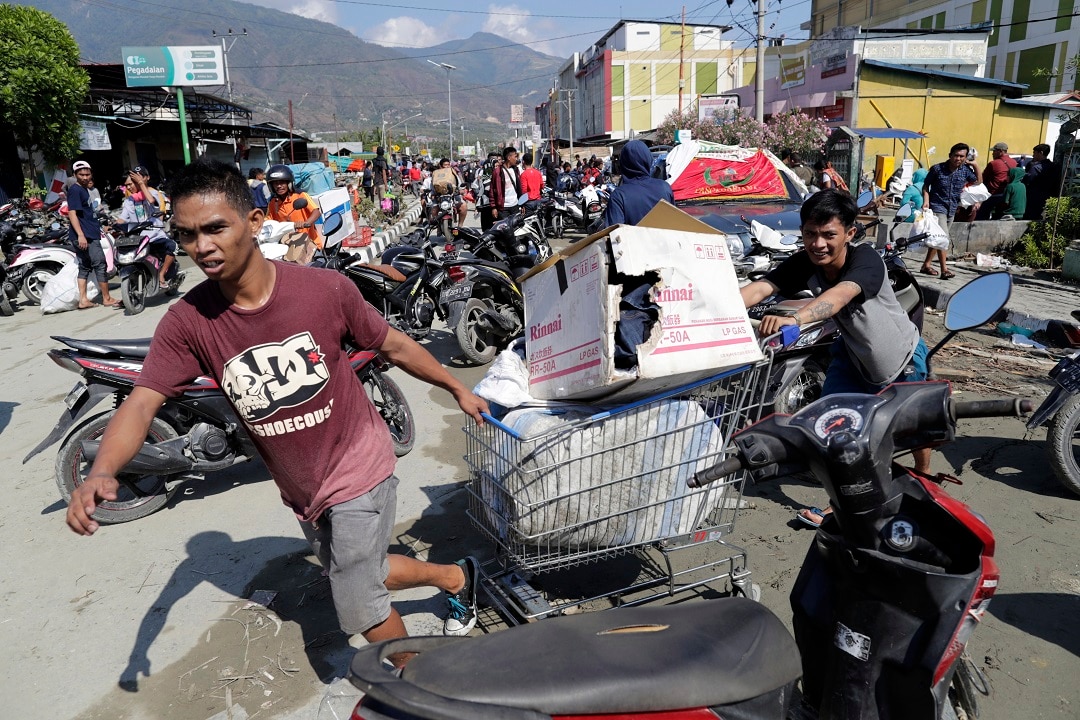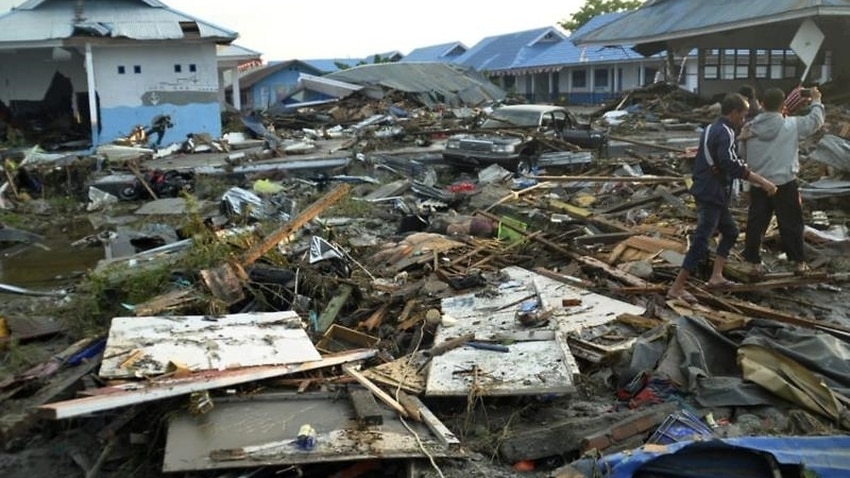Mass burials to begin as death toll from Indonesian disaster surges

READ MORE
The death toll in Indonesia’s quake-tsunami disaster nearly doubled to more than 800 Sunday, as ill-equipped rescuers struggled to reach scores of trapped victims, health officials resorted to mass burials and desperate residents looted shops for food and water.
“The casualties will keep increasing,” said national disaster agency spokesman Sutopo Purwo Nugroho, whose agency announced 832 deaths.
“Today we will start the mass burial of victims, to avoid the spread of disease.”

Indonesian Vice-President Jusuf Kalla said the final death toll in the north of Sulawesi island could be in the “thousands” since many regions have still not been reached.
“It feels very tense,” said 35-year-old mother Risa Kusuma, comforting her feverish baby boy at an evacuation centre in the gutted coastal city of Palu. “Every minute an ambulance brings in bodies. Clean water is scarce. The mini-markets are looted everywhere.”
“Communication is limited, heavy machinery is limited… it’s not enough for the numbers of buildings that collapsed,” Nugroho said.
The 7.5-magnitude quake struck Friday, sparking a tsunami that ripped apart the city’s coastline.
Save The Children program director Tom Howells said access was a “huge issue” hampering relief efforts.
“Aid agencies and local authorities are struggling to reach several communities around Donggala, where we are expecting there to be major damage and potential large-scale loss of life,” Howells said.
Dozens of corpses lay in an open courtyard at the back of a Palu hospital, baking under a fierce tropical sun, with only one building separating it from an open triage site on the opposite side.
“I have one child – he’s missing,” Baharuddin, a 52-year-old Palu resident, told AFP as he stood on floor tiles smeared with blood.
“I last spoke to him before he went to school in the morning.”
The disaster agency said it believed about 71 foreigners were in Palu when the quake struck, with most safe.
Three French nationals and a South Korean, who may have been staying at a flattened hotel, had not yet been accounted for, it added.

Palu airport reopens to skilled pilots
Amid the levelled trees, overturned cars, concertinaed homes and flotsam tossed up to 50 metres inland, survivors and rescuers struggled to come to grips with the scale of the disaster.
Indonesian president Joko Widodo has arrived in the region Sunday afternoon to see the devastation for himself.
On Saturday evening, residents fashioned makeshift bamboo shelters or slept out on dusty playing fields, fearing powerful aftershocks would topple damaged homes and bring yet more carnage.

C-130 military transport aircraft with relief supplies managed to land at the main airport in Palu, which re-opened to humanitarian flights and limited commercial flights, but only to pilots able to land by sight alone.
Satellite imagery provided by regional relief teams showed the severe damage at some of the area’s major sea ports, with large ships tossed on land, quays and bridges trashed and shipping containers thrown around.
Hospitals were overwhelmed by the influx of those injured, with many people being treated in the open air. There were widespread power blackouts.
“We all panicked and ran out of the house” when the quake hit, said Anser Bachmid, a 39-year-old Palu resident. “People here need aid – food, drink, clean water.”
Australian PM offers support
Australia has offered Indonesia whatever help the country requires as it responds to the natural disaster.
Prime Minister Scott Morrison called Indonesian President Joko Widodo overnight to express his sympathies and pledge support.
“If he needs our help, he’ll have it,” Mr Morrison told the ABC on Sunday, describing the rising death toll as “horrific”.
“Australia’s deep sympathies and concerns and our readiness to stand with them and support them as needed,” he said.
“They haven’t asked for any of that, but the President was very appreciative of Australians’ empathies.
“But it’s the remote parts of the country and the next challenge will be, as you know, when you have these disasters that it can compound very quickly.

“So providing support as needed to secure the scene and make sure that issues do not deteriorate further, I think will be a big challenge.”
Opposition Leader Bill Shorten said the Sulawesi disaster was particularly tragic because it came so soon after last month’s Lombok earthquake.
“Labor stands with the government in offering whatever support is needed to help the people of Indonesia recover from this tragedy,” he said.
“Australia should consider all available options to help in the immediate aftermath of this tragedy, as well as longer term assistance to support the people of Sulawesi to rebuild their homes and infrastructure.”
Australia sends our condolences to Indonesia, especially those in Sulawesi who have lost lives, family, friends and livelihoods.
As we learn the extent of this disaster, our thoughts are with the first responders who will play such a vital role in the coming days.
— Bill Shorten (@billshortenmp) September 29, 2018
Comments
Post a Comment